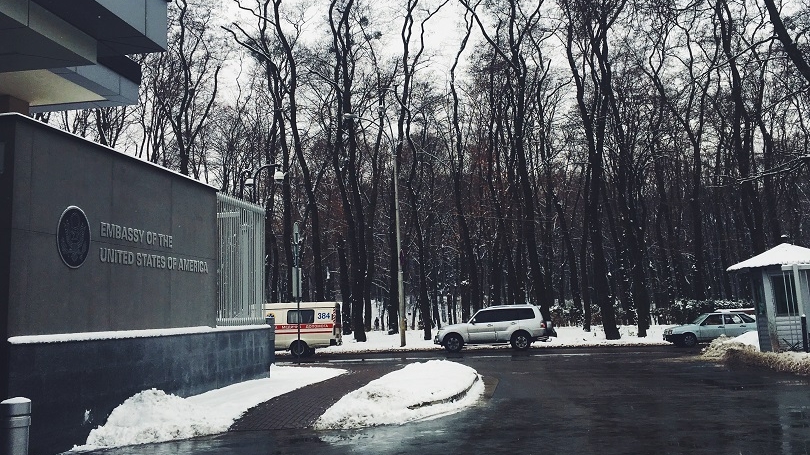
- Public Policy
- Leadership
- Funding
- News & Events
- About the Center
Back to Top Nav
Back to Top Nav
Back to Top Nav
Back to Top Nav
Grey skies; grey buildings. Churches standout: painted lemon yellow and tangerine orange, splashed with gold and pink. They’re bizarre tropical phantasies in land of Soviet phantoms. It’s welcome contrast for travel-weary eyes. Brutalist and bright, these architectural paradoxes blur past our van as we wind our way towards the Embassy.
Winter has arrived in Kiev. Snowflakes drift easily on a dry breeze. A security guard taps ash from a cigarette. He fixates on the windows of our van. I nod hello; he glares back greetings. His green camouflage uniform looks out of place in the grey-and-white checkerboard of Eastern Europe in December.
We get out. Inside the Embassy more security guards size up the group. No electronics, no water, no nonsense. They mean it. Of the fourteen of us, twelve are suspect: goods confiscated and bodies re-scanned. Burgeoning democracy though it may be, in Ukraine, you respect authority.
Red badges mark us out as visitors. We require escort. Dan, the USAID program director, zips up a heavy parka to fetch us. He ushers us over to a conference room with chairs clustered in the half-moon style that second graders everywhere prefer for show-and-tell. Dan shows us the lay of the foreign aid land; we tell him about our research and our plans.
Smelling our group’s youthful ambition, the mission director makes a plug for work as a foreign officer. Says it provides a quality of life she could never attain in the States. The other foreign officers in the room emphatically add their consensus. You can sense that some travel bug has bitten them all. They’ve got that itch for adventure. It’s so visible—in their enthusiasm about languages, in their ambivalence about DC, in their nostalgia for Gaza and Indonesia and Sudan—it might as well be a rash across their foreheads.
They might as well wear red badges to mark themselves out as visitors. We’ll be here three weeks; they’ll be here three years. Difference isn’t much, in the long view.
And democracy work requires the long view. Some of these officers have been at it for twenty years and still can’t claim they’ve moved the needle forward on democratization. It’s hard to measure outcomes, they explain, plus, change comes incrementally. They’re optimistic, though. They’re eager and antsy and curious, too. That’s what binds this group together.
We’ve got visitor badges and too many iPhones and peach fuzz, but I think our group has that sticky Crusoe curiosity, too. Even with the citrus colored churches, it’s bitter cold and grey here, and we’ll need a bit of that gooey-eyed go-getter glue to make it through the next three weeks.
Written by Alexa Sonnenfeld '17
This is part of a series where student reflect on their experiences during the field research portion of the PBPL 85:Global Policy Leadership course.